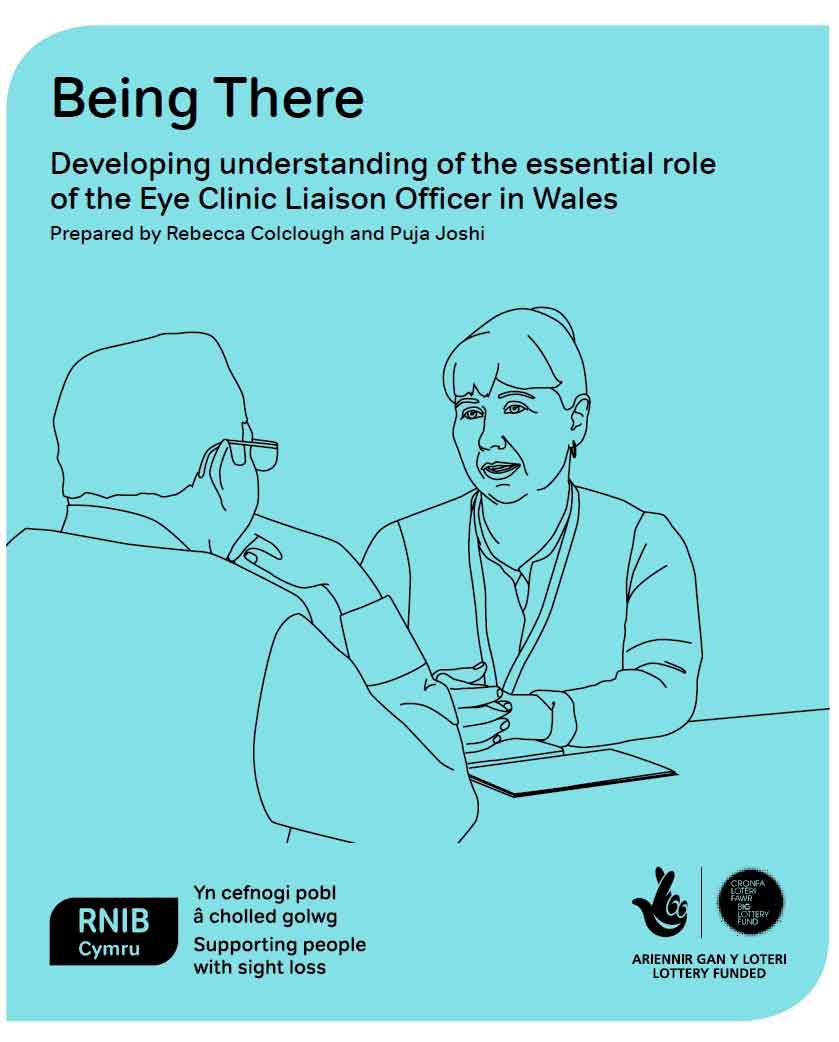‘Being There’ means more than just being there!

There’s never a good time to be given devastating news, but how much worse is it when there’s no-one around to comfort, support, advise and help when you’ve been told the worse. This was the scenario facing thousands of people with sight loss across Wales until recent years.
Being given hope and support at a time of distress, despair and fear is so important if someone is going to be able to come to terms with life-changing news, and this is the work of the Eye Clinic Liaison Officers (ECLOs) when patients receive bad news regarding current or impending sight loss.
Thanks to RNIB Cymru and funding from the Big Lottery Advantage programme, Betsi Cadwaladr University Health Board and Cwm Taf University Health Board, there are now twelve ECLOs covering Wales.
ECLOs provide emotional support to eye clinic patients; accessible information on their condition and treatment; referrals to community, health and social care support services; information about the certification and registration process; referrals to specialist services such as welfare rights, employment, education and transitions; support for families, carers and friends; and, awareness training and organising patient support groups.
On launching the RNIB Cymru report ‘Being There – Developing understanding of the essential role of the Eye Clinic Liaison Officer in Wales’, Ceri Jackson, Director of RNIB Cymru said:
“In RNIB Cymru’s view, the true value of the ECLO service really lies in its benefit, on a one to one basis, to people who are given the type of news that none of us would wish to hear. News regarding sight loss that is devastating. But the ECLOs across Wales have the training which enables them to provide some life-saving hope and encouragement, and support for patients who are often struggling to find their way through a frightening and complex sight loss journey.
“The Being There report provides evidence of how important the ECLO services are to people with sight loss and the very real positive difference they make in people’s lives. The hope is that this evidence will be a motivation to enhance the service and provide funding for more ECLOs within the health sector.”
The role of the Eye Clinic Liaison Service is widely recognised, and is included in the Welsh Government eye care pathways for Age Related Macular Degeneration and Glaucoma.
Dr Andrew Goodall, Director General of Health and Social Services/Chief Executive, NHS Wales said:
“Really good patient care requires everyone to work together to provide seamless services across health and social care. By using patients’ stories, this [Being There] report showcases how ECLOs do that every day in some of the busiest hospital clinics around Wales. ECLOs deliver the principles of prudence, partnership, integration and collaboration.
“I would encourage everyone to embrace their local ECLO service and consider, each step of the way, whether their input would improve the care you can provide to your patients or clients.”
The case studies within the Being There report are real life case studies, personal experiences of people in Wales who have been supported by ECLOs. Singleton Hospital Consultant Opthalmologist David Laws said:
“ECLOs fulfill a role that has been needed for years. Patients complained that if their vision deteriorated there was little co-ordination between the clinic and community services; the ECLO smoothes this path out.”
Whilst Senior Sensory Officer Tracy Martin-Smith from Pembrokeshire added:
“ECLOs are the liaison between the patients in the eye clinic, local authorities, and third sector.”
Case Studies:
Architect Stephen Waldron from Ystradfellte has high praise for his Powys ECLO Keira Brooks:
“I have a genetic eye condition, but suddenly over a weekend at the end of October last year I noticed a major deterioration in my sight which meant that overnight I had to stop driving.
“I own and run my own architecture business and my priority was keeping this up and running for the colleagues and clients depending on me. I struggled to read, write and produce my drawings for clients. I also need to travel to visit clients so I had to rely on others to drive which was becoming more and more unsustainable.
“Keira has been a great help. She’s been phoning regularly and been very supportive. She’s referred and sign-posted me to RNIB’s resources such as Employment Support – to help me with access to work; to the Rights, Advice and Information Service (RAISE) regarding Personal Independence Payment (PIP); and to Online Today for help with accessing technology.”
On the other hand, renown Welsh actor and recently retired Pobol y Cwm star Gareth Lewis (Meic Pearce on Pobol y Cwm) originally from Felinheli, Caernarfon but living in Cardiff, says he would have appreciated the support of an ECLO had he been referred:
“My eyesight has been deteriorating since my early 20s and was probably the main reason for me retiring from Pobol y Cwm a couple of years ago. I was having trouble reading scripts, moving to the correct place on the set, and even moving safely between sets.
“The ECLO service wasn’t in existence when I was told in the 1970s that my sight was going to deteriorate over the years, but even at a recent Consultant
appointment where I was told that it had deteriorated significantly these past twelve months, the ECLO service wasn’t mentioned to me.
“On reading these case studies, I’m well aware that I have missed out on ECLO support over recent years, but I’m pleased they are available and that a number of them, like Ruth, can provide that service bilingually.
“It has been quite daunting for me to tell my story of sight loss so openly in my recent autobiography, but the whole process has enabled me to find out more about resources and services out there, which is why part of the deal with my publishers was that I wanted to ensure that it was also available in ‘talking book’ version.”

